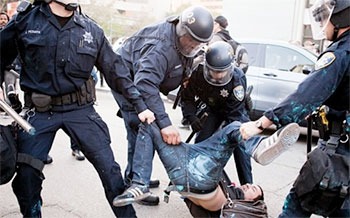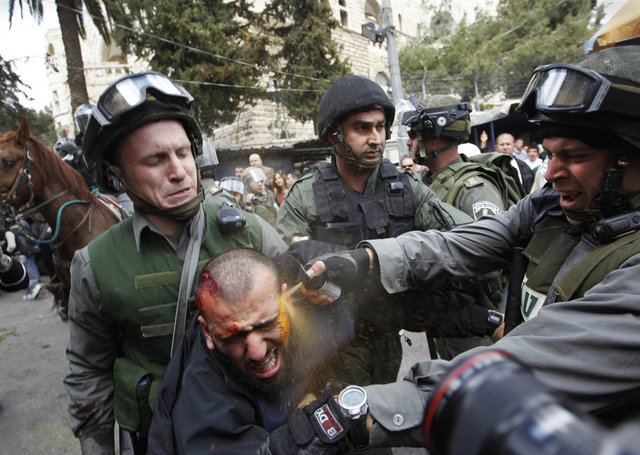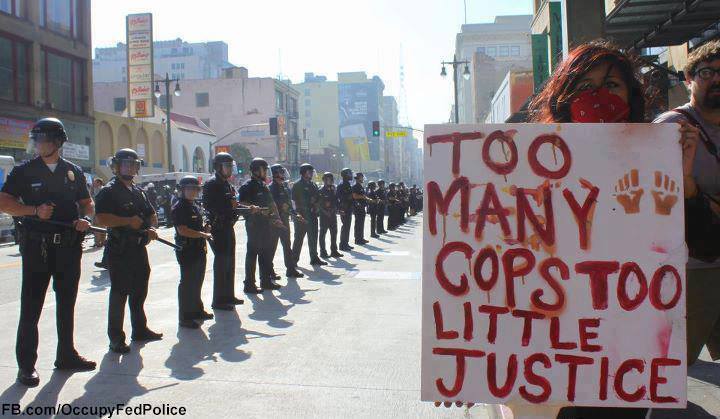waitforitb
Police brutality is something that has always occurred, but now it's becoming more public. As technology advances, it makes acts of brutality, easier to be broadcast on the World Wide Web. One would think, that public broadcasting on the WWW (world wide web) would make police brutality stop or help bring justice; however, that is not the case. A law enforcement officer's job is to enforce the laws, as well as protecting the citizens from harm. What we are starting to experience is, being harmed by those that are supposed to protect us. That goes against the principles set for these officers. Not only is it happening, but they are getting away with it. If you have someone in handcuffs pinned down, and you still harass them and possibly kill them, that is murder. Some incidents result in; hospitalization, bad injuries, and in some cases death. The consequences of police brutality could be due to poor training of law enforcement officers, little to no training, little to no consequences, no oversight, racism, ability to use power, some victims making misleading movements, the system believing the officers, even though witness against is present, and poor judgment. A closer look might reveal that each of these reasons could apply to the problem. However, it does not appear those police officials are taking appropriate action to minimize or eradicate acts of police brutality.

The Michael Brown case presents one example of police brutality, Onyemaobim, Ikedi O, reports that "On August 9, 2014, in Ferguson, Missouri, Brown, an 18-year-old, unarmed African-American teenager, was fatally shot by Darren Wilson, 28, a white Ferguson police officer." There is a controversy on whether or not, it was done out racial profiling, which is a big issue in today's world. The answer to that only Wilson know's. What is know; however, is that he was unarmed, and got killed. This is could fall under, "uneducated officers." We are not talking about book smart here, we are talking about common sense, and people education. People education is just basically being educated to deal with different types of people, from different backgrounds. If officers underwent a training in which they deal with a diverse group of people, from different backgrounds and mental issues this might lower the percentage in which officers are committing crimes "in a legal way." If the test is failed, even just once the subject should not be allowed to work as a law enforcer. How is it a big deal to get your license at 16, but this is not.? It makes no sense, more thorough training should be done.
According to Chaney, Cassandra, and Ray Robertson in, "Racism and Police Brutality In America," the Michael incident may be an example of a racial profiling to some extent, it seems that abusing their powers, and rights, is a major issue. On September 28, 2011, at 12:34 a.m. 63-year old Lorraine said, "that the police in her community were part of a gang, she was arrested “based on a false report,” was not read her “Miranda” rights, and was personally battered by the police." Clearly, it is, as she said, a "gang," that is basically what our policemen have come to. Consider it a "legal gang;" However, Just because some have been terrorizing the streets they are supposed to protect, does not mean everyone is the same. Nevertheless, this has to stop, the stricter punishment should be given out. We need more than just body camera, every angle surrounding the officers should be covered.
Looking into the article, "Who Watches The Watchmen," we that in the past these crimes have been easily hidden. "in the past, events of police violence were more easily brushed off as an intermittent, rather than an epidemic." With today's technology; however, we are able to capture a bit more of what goes on. Now officer's are equipped with a body camera, that is supposed to capture what goes on. If this is followed correctly, we should have more proof and prosecute the officer. With that being said, they should not be allowed to ever work as a law enforcer again. In the real world civilians get court time for the smallest of things, so why should policemen walk out with minimal consequences for unjustly killing, an innocent. With more vision on the officers, we can only hope that it stops.

Examining these articles, we clearly see that misuse of power is definitely a major problem, that is not being addressed properly in most cases. As the victims are of all backgrounds and ages. Seeing both, "Michael Brown's, and Lorraine's"Journals, it verified that age does not play a role, and for that matter neither does gender. It almost starts to seem like a psychological problem, for the officer's committing the crimes. Thus, a more thorough, mental and personal background checks should be part of the requirements to join the team. We need to understand that as civilians, we have cameras watching us everywhere, and we can get jail time for the smallest of offenses; it does not seem right that someone that clearly did not need to pull out their gun, does and kills an innocent person, yet minimal penalties are issued in most cases. It is time to put an end to this "legal gang."
When found in tight spots officials will fight their way, to have their employee walk away with these crimes. Looking through, "Cops involved in police brutality cases face consequences." "[Police Commissioner] Bill Bratton’s decision to charge was politically motivated,” he said. “We will strenuously defend against the charges." The incident happens in New York, 2014, "Eric Gamer being the victim and Sgt. Kizzy the officer". She choked Eric to death. Although she got her badge taken away, she still walked out. This incident, can not be ignored so easily, it will just become a habit that others will continue to commit.
However, there are guidelines of how to act under certain scenarios, so officers do not act in a negative way. Investigating Hayes, Dennis. “Police Brutality: What We Can Do!" There are several tips given that really stand out; Don't panic or flee, Make a mental note of the misconduct, the police officer's badge number, car number and facial description, Remember what the police officer says to you if it is a racial epithet, If your car is stopped, do not make sudden moves as if you are going for some weapon, even if you actually are reaching to get your driver's registration papers from the glove compartment. Sit there with both hands on the steering wheel and follow the police officer's instructions, and/or Don't try to get into a give-and-take with a police officer about whether you could or could not have committed a crime. You can't win such a debate, and what you say could be construed as some kind of admission." Also goes to say how you should never get in a dispute with an officer, whether who is right or wrong.
The police departments are also trying to play a part, in ensuring that justice is served and officers don’t make any wrong movements neither. Going back to Michael Brown's case, "The officer who shot Brown, and the grand jury that decided not to indict him for Brown’s death, believed the shooting of Brown was justified." Even though, there were witnesses who saw it in action. As mentioned In Nielsen, Erik. “Fourth Amendment Implications of Police-Worn Body Cameras." With technology advancing, and the multiple crimes officers have gotten away with. The body camera was introduced. "The footage would provide objective evidence of the incident, 20 and importantly, would allow an individual—or group of individuals—to view the incident from the perspective of the officer who used the force. 21 This would allow them to step into the shoes of the officer." Hopefully, this helps bring more justice to the courts, and/or hopefully end this police brutality.

Not all cases are created equal, as "only one officer has been convicted of intentional murder: a Colorado cop who followed an unarmed man into the man’s home, shot him in the back while his mother watched, and then pepper-sprayed him. That officer received a 16-year sentence." As Schatz, Bryan. “Killer Instincts.” Mother Jones, vol. 42, no. 2," mentions. In this particular case, the officer had no reason to follow the man. In a way it could also be considered as, stalking which I'm sure should add more to his time, just as it would to anyone else. Thankfully this body should be able to capture everything from the start. As more is been revealed, we can hope that it stops. As officers see that even they are getting prosecuted, the rate at which this crime are being committed stops.
Seeing the many ways to prevent police brutality, it would appear easy, but it is not. This works both ways, as officers should also take their own set of precautions to not cause unnecessary injuries. A way this is being worked in is by, equipping officers with body cameras; which in return should be able to capture the scene right from the start. This is not to say that, "technical problems," couldn’t happen, because they can. At the same time civilians can also take certain precautions such as; not making sudden movements, because if the officer shoots you then, the can use you moving suddenly as a way to not prosecute the officer, also do not try to argue ever, this is possibly one of the worst things you could do.
Although, many cases would involve, nonwhite victims, it is not enough to say this is simply just due to racism. The actions the officers take, when they injure a victim, has more than just one cause, that is slowly being addressed, and some that need to be brought to attention. Examples are; poor training, little to no consequences, no oversight, racism, ability to abuse powers, some victims making misleading movements, the system believing the officers, even though witness against is present, and poor judgment. Surely there are more that can be added to the list, but this is what has been focused on. Police brutality must stop, it has gone on too long, and will continue if brushed aside. We are at the point in which, terrorism might be closer than meets the eye. So let the voices be heard, and speak up. It is the only way to make this injustice brutality be eradicated. Maybe not all over the world, but it has to start somewhere. All lives matter.
Chaney, Cassandra, and Ray Robertson. “Racism and Police Brutality in America.” Journal of African American Studies, vol. 17, no. 4, Dec. 2013, pp. 480–505. Academic Search Complete, doi:10.1007/s12111-013-9246-5. Accessed 18 Apr. 2017.
Hegarty, Joshua. “Who Watches the Watchmen? How Prosecutors Fail to Protect Citizens from Police Violence.” Hamline Journal of Public Law & Policy, vol. 37, no. 1, Jan. 2017, pp. 304–336. Academic Search Complete, ezproxy.vccs.edu:2048/login?url=http://search.ebscohost.com.ezjsrcc.vccs.edu:2048/login.aspx?direct=true&db=a9h&AN=120996849&site=ehost-live. Accessed 18 Apr. 2017
“Nation.” Nation, vol. 299, no. 7/8, 18 Aug. 2014, pp. 11–11. Academic Search Complete.
Onyemaobim, Ikedi O. “The Michael Brown Legacy: Police Brutality and Minority Prosecution.” George Mason University Civil Rights Law Journal, vol. 26, no. 2, 2016, pp. 157–182. Academic Search Complete, ezproxy.vccs.edu:2048/login?url=http://search.ebscohost.com.ezjsrcc.vccs.edu:2048/login.aspx?direct=true&db=a9h&AN=116259931&site=ehost-live. Accessed 18 Apr. 2017.
Schatz, Bryan. “Killer Instincts.” Mother Jones, vol. 42, no. 2, Mar. 2017, pp. 28–29. Academic Search Complete, ezproxy.vccs.edu:2048/login?url=http://search.ebscohost.com.ezjsrcc.vccs.edu:2048/login.aspx?direct=true&db=a9h&AN=121199224&site=ehost-live. Accessed 18 Apr. 2017